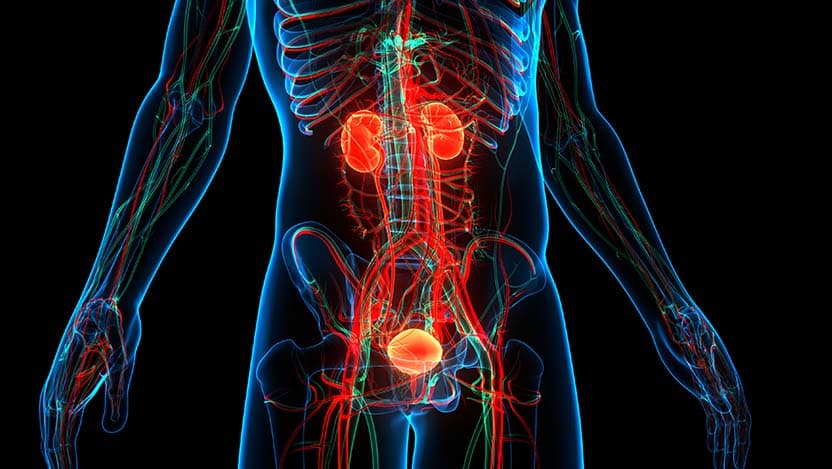Newly identified personalized immunotherapy combination treats an aggressive form of advanced prostate cancer

The team, led by Akash Patnaik, MD, PhD, MMSc, Assistant Professor of Medicine at the University of Chicago Medicine Comprehensive Cancer Center, discovered that the immune system promotes the growth of cancer — instead of suppressing it — through recruitment of abnormal tumor-associated macrophages (TAMs) that express PD-1 into the tumor microenvironment.
Therapy resistance spells trouble for treatment
Hormonal therapies such as androgen deprivation therapy (ADT) and chemotherapies are first-line treatment options for treating metastatic prostate cancer. Although these therapies can improve the odds of survival, most patients will find their cancer returning. Chemohormonal therapies can also contribute to the development of aggressive forms of treatment-resistant prostate cancer.One such aggressive form of advanced prostate cancer results from the loss of a particular gene called phosphatase and tensin homolog (PTEN), which drives hyperactivation of the phosphatidylinositol kinase-3 (PI3K) growth and survival pathway. As a result, cancer cells grow out of control.
“Given that PTEN/PI3K pathway alterations are one of the most frequent ‘drivers’ of human disease across all cancers, there have been several pharmaceutical efforts to target this pathway over the past decade. However, single-agent responses have been very limited to date,” said Patnaik.
Recent clinical studies have found that PI3K inhibitors in combination with ADT in mCRPC patients have only limited efficacy. To understand the mechanisms underlying the response and resistance to combinatorial ADT/PI3K inhibitors, Patnaik and his team performed simultaneous preclinical studies at in a PTEN-deficient mouse model which also lacked p53, another common alteration in human cancer that drives aggressive disease.
They discovered that PD-1-expressing immunosuppressive TAMs were recruited following ADT/PI3K inhibitor treatment and blocked anticancer immunity mediated by macrophages. To test whether blocking PD-1 would increase the antitumor efficacy, PD-1 checkpoint immunotherapy was added to the ADT/PI3K inhibitor combination. The results showed a significantly increased overall response rate in mice.
The role of metabolic pathways
The ways in which cells consume and use energy, called metabolic pathways, play a key role in driving aggressive tumors like mCRPC to grow and spread uncontrollably, especially with hyperactivated PI3K pathways in PTEN-deficient context. In the current study, the team found that blocking PI3K suppresses lactate — a byproduct from glucose metabolism. Further investigation showed that tumor cells crosstalk with macrophages via lactate, which reprograms the macrophages to promote the growth of the cancer.“While we were initially surprised that blocking the PI3K pathway in PTEN-deficient cancer cells did not kill them in a Petri dish, we quickly discovered that it blocked the ability of cancer cells to educate macrophages via lactate. The disabled lactate-mediated communication flipped the switch in these cancer-promoting macrophages, so they have an enhanced ability to eat cancer cells,” said Patnaik.
Unfortunately, PI3K inhibitors alone are insufficient, because cancers have figured out many ways to escape immune attacks and develop immune resistance. So, the team tested a combination therapy of ADT and PI3K inhibition in PTEN/p53-deficient mice and observed modest responses similar to what was seen in clinical trials. The insufficient response was driven by the recruitment of PD-1-expressing macrophages that can suppress a potent antitumor response.
Wnt/β-catenin signaling driving force for lactate
To test whether blocking PD-1 could increase the antitumor effects of the combined therapy, the team tried adding PD-1 blockers. They observed a significantly enhanced 60% response rate with the triple combination in mice, but 40% remained resistant to the therapy.
It’s all coming down to cancer cells being evolutionarily hard-wired to preserve lactate protection, which has profound implications for macrophage-mediated anticancer immunity.To determine why 40% of the cases remained resistant to treatment, the team conducted follow-up experiments and found an activation of Wnt/β-catenin pathways that restored lactate production in the treatment-resistant cases.
“It’s all coming down to cancer cells being evolutionarily hard-wired to preserve lactate protection, which has profound implications for macrophage-mediated anticancer immunity,” added Patnaik. “The findings from our study demonstrate the importance of disrupting immunometabolic pathways in PTEN-deficient cancers, to find sustainable solutions for these aggressive cancer types.”
According to Patnaik, the right combination of therapies like PD-1 blockers with ADT and PI3K inhibitors can bring more success when treating aggressive PTEN-deficient prostate cancers that don’t respond to conventional therapies.
The work described in Clinical Cancer Research was funded in part by the Reversal of lactate and PD-1-mediated macrophage immunosuppression controls growth of PTEN/p53-deficient prostate cancer,” was also funded by the National Institutes of Health and the National Cancer Institute.
Additional authors include Kiranj Chaudagar, Hanna Hieromnimon, Brian Labadie, Jordan Shafran, Anne Kelley, Srikrishnan Rameshbabu, Mayme Loyd, Kaela Bynoe, Catherine Drovetsky, Ani Solanki, Erica Markiewicz, Marta Zamora, and Xiaobing Fan from the University of Chicago; Rimpi Khurana and Stephan Schürer from the University of Miami; Taghreed Hirz and David B. Sykes from Massachusetts General Hospital Cancer Center; Shenglin Mei from Harvard Medical School; Raisa Hasan, Eva Apostolov, Ghamdan Al-Eryani, Kate Harvey and Alex Swarbrick from the Garvin Institute of Medical Research in Darlinghurst, Australia and the University of New South Wales in Sydney, Australia.

UChicago Medicine Comprehensive Cancer Center
UChicago Medicine is designated as a Comprehensive Cancer Center by the National Cancer Institute, the most prestigious recognition possible for a cancer institution. We have more than 200 physicians and scientists dedicated to defeating cancer.
Learn More About the Comprehensive Cancer Center
Akash Patnaik, MD, PhD, MMSc
Akash Patnaik, MD, PhD, MMSc, is a medical oncologist specializing in the care of patients with genitourinary cancers, including prostate, bladder, kidney and testicular cancers. He also has a strong interest in the development of novel therapeutics for treatment of advanced solid tumors.
Read Dr. Patnaik's physician bio